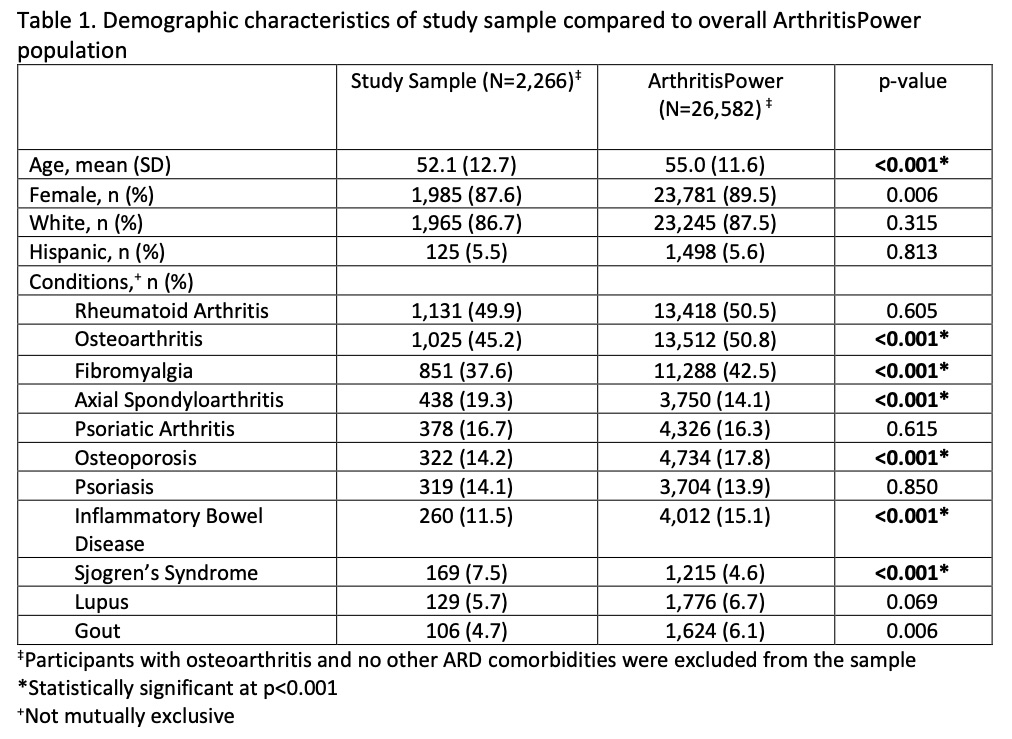Session Information
Date: Tuesday, November 9, 2021
Title: Patient Outcomes, Preferences, & Attitudes Poster IV: COVID-19 (1589–1613)
Session Type: Poster Session D
Session Time: 8:30AM-10:30AM
Background/Purpose: The COVID-19 pandemic caused particular concern among patients with autoimmune and rheumatic disease (ARD) due to increased risk of infection, and heightened sense of isolation due to social distancing.1 We sought to determine whether mean patient-reported outcome scores for mental, social and physical health fluctuated during the COVID-19 pandemic.
Methods: Participants (pts) of ArthritisPower research registry completed PROMIS measures of physical health (Physical Function, Pain Interference, Fatigue, Sleep Disturbance), mental health (Anger, Anxiety, Depression) and social health (Social Isolation, Emotional Support) from January 2020 to April 2021. PROMIS measures are scored 0-100, with US general population mean of 50, and 10 as the standard deviation (SD) of the reference population. We tested the null hypothesis that there was no change in monthly average PROMIS scores across the 15-month pandemic period. Analysis of means (ANOM) compared assessment mean scores for each of the 15 months to overall mean score for each measure during the observed period. Pts with < 2 assessment time points and osteoarthritis with no ARD were excluded from analysis.
Results: A total of 41,547 PRO scores were contributed by 2,266 pts, with 4.5 (6.9) mean (SD) number of observations per pt. Among pts, 87.6% were female, 86.7% white, with mean age of 52.1 (12.7) years (Table 1). Rheumatoid arthritis (n=1,131, 49.9%) was the most common condition. The study sample was younger than the overall ArthritisPower population (55.0 [11.6]; p< 0.001). Most commonly reported measures were the default measures of Pain Interference, Fatigue, Sleep Disturbance and Physical Function; each had more than 9,000 total results. For all measures, PROMIS scores were worse than the US population mean during the observed period (Table 2). Over 15 months, mental health assessment scores varied significantly; mean (SD) overall study period scores were: Anger 61.6 (13.0), Anxiety 63.1 (10.7) and Depression 61.2 (9.5). In January and February 2020, Anger and Anxiety had significantly lower scores compared to the overall assessment mean. However, during the months of May and June 2020, mean scores were elevated by a standard deviation for Anger (May: 74.2 [14.1], p< 0.001; June: 76.4 [12.1], p< 0.001) and Anxiety (May: 72.0 [11.1], p< 0.001; June: 73.3 [12.3], < 0.001). Depression scores, while lowest in January, increased by half a standard deviation in May (66.6 [13.0], p< 0.001) and June 2020 (67.4 [11.1], p< 0.001). Among the social health assessments, Social Isolation peaked in June (66.0 [7.1]; overall mean 61.7 [9.9]) and Emotional Support dipped in December 2020 (36.7 [9.6]; overall mean 41.4 [9.7]) (Figure). Scores did not meaningfully vary from the overall mean for any of the physical health assessments across the 15 months.
Conclusion: Despite scores for mental health fluctuating significantly, particularly during the first US wave of the COVID-19 pandemic, scores for physical health remained relatively stable across the pandemic period.
1. George M, et al. Rheumatology. 2021;48:603-7
 Table 1. Demographic characteristics of study sample compared to overall ArthritisPower population
Table 1. Demographic characteristics of study sample compared to overall ArthritisPower population
 Table 2. Average assessment scores by month, mean (SD)
Table 2. Average assessment scores by month, mean (SD)
 Figure. Patient Reported Outcomes (PROs) Throughout the COVID_19 Pandemic (Nf2,266)
Figure. Patient Reported Outcomes (PROs) Throughout the COVID_19 Pandemic (Nf2,266)
To cite this abstract in AMA style:
Gavigan K, Rivera E, Curtis J, Venkatachalam S, Stradford L, Curtis D, Nowell W. Changes in Patient-Reported Outcome (PRO) Scores During the COVID-19 Pandemic: Data from the ArthritisPower Research Registry [abstract]. Arthritis Rheumatol. 2021; 73 (suppl 9). https://acrabstracts.org/abstract/changes-in-patient-reported-outcome-pro-scores-during-the-covid-19-pandemic-data-from-the-arthritispower-research-registry/. Accessed .« Back to ACR Convergence 2021
ACR Meeting Abstracts - https://acrabstracts.org/abstract/changes-in-patient-reported-outcome-pro-scores-during-the-covid-19-pandemic-data-from-the-arthritispower-research-registry/
